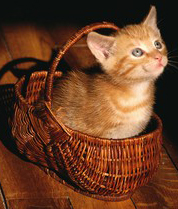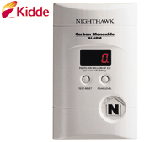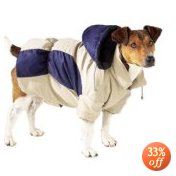|
|

|

Winter Dangers to Your Pet: Don't Let Fido and Fifi Freeze!
by SixWise.com
|
While
it is second nature in people to bundle up in coat, hat and
gloves when cold weather hits, many people overlook the fact
that their pets require extra care, too, during winter.
If
you belong to the 39 percent of U.S. households with a dog
or the 34 percent with a cat -- or if you own a more exotic
pet like a potbelly pig, rabbit or ferret -- be aware of the
following potential winter dangers. This will help keep your
pet safe in the short-term, and help them live a longer, healthier
life overall.
Don't
Leave Your Pet Out in the Cold
The
amount of time your pet should spend outdoors on frigid days
depends on their breed. While some dogs like St. Bernard's
and Huskies and some longhair cats are bred for cold weather,
others, like Grey Hounds and shorthair cats, are not.
Cats
and dogs that are shorthaired, warm-weather animals should
only be outside long enough to relieve themselves on cold
winter days and nights.
|
 |

Dogs and cats, America's
favorite pets, do have some built-in
precautions against the cold (their
fur, for one), but by no means does
that make them immune to the winter
weather and it's related stresses.
|
If
your pet is left outside unprotected in ice, snow and freezing
temperatures, it is vulnerable to the same risks as humans left
outside in the cold:
- Hypothermia:
This occurs when your pet's body temperature falls below
normal. Symptoms include shivering, depression, lethargy,
muscle stiffness, slowed breathing and heart rate and being
unresponsive to stimuli.
Pets
should be immediately wrapped in blankets (electric blankets
if possible) with a hot water bottle and taken to the veterinarian
if they show signs of hypothermia.
- Frostbite:
Like humans, if your pet gets cold enough, its body will
pull blood from the limbs in order to keep the center of
the body warm. Your pet's tail, ears, and paws are then
vulnerable to ice crystals that can form and damage the
tissues.
If
you suspect frostbite -- your pet may whine or look for
warm places to burrow in -- find the suspected frostbitten
areas and soak them in lukewarm (not hot!) water for about
20 minutes. DO NOT rub the tissue, as this can cause further
damage. Then wrap your pet in blankets and get them to the
veterinarian.
Winter
Precautions if You MUST Leave Your Pet Outside
- Make
sure your pet has a warm, dry place to escape the elements
- Provide
thick bedding and a hot water bottle for warmth
- Be
sure there is a source of fresh water that will not freeze
- Feed
them smaller portions more often throughout the day
- Make
sure your pet stays dry, including free of snow
- Cats
will curl up under car hoods on car engines to keep warm.
If you know you have pet cats or stray cats in your area,
it is always a good idea to check under your hood and car
(or at least bang the hood of the car to check) before driving
Hidden
Winter Toxins, Chemicals and Gases
The
winter season brings with it a unique set of risks from de-icing
chemicals, salts and carbon monoxide leaking from furnaces
(a major risk for humans too). Watch out for these risky chemicals,
and keep your pets clear of them:
Rock
Salt and Chemical Ice Melters: These can irritate paws
and cause digestive problems if ingested.
|
| |
Carbon
Monoxide: Carbon monoxide is an odorless, invisible
gas that can leak from furnaces that are used constantly
in the winter. Since pets often spend even more time in
homes than their owners, they are particularly vulnerable
to poisoning. This is why SixWise.com strongly recommends,
for your pet's sake and your own, investing in a high quality,
reliable carbon monoxide detector.
After
research and careful review, by far the most highly rated
line of carbon dioxide detectors we found are those by Kidde
Nighthawk, and one that is particularly recommended is the
Kidde
Knighthawk Carbon Monoxide Alarm Kopp-3. This alarm
plugs into any standard wall outlet and offers superior
protection against carbon monoxide.
|
 |

A carbon monoxide alarm is a safety
"must" for every home to protect you,
your family and your pets! This UL
approved Kidde Knighthawk Carbon
Monoxide Alarm is the top-rated alarm
and a great value ... read
more now!
|
Antifreeze,
Oil, Household Cleaners: Commonly used cleaners and
antifreezes can be deadly to your pet. Antifreeze is particularly
alluring to pets because of its sweet taste. According to
Janet Tobiassen Crosby, DVM, a safe alternative to the commonly
used Ethylene Glycol antifreeze for your automobile is propylene
glycol. Though it is a bit more expensive, it's worth the
piece of mind, Crosby says.
Mothballs:
When you take your sweaters out of the closet, be sure your
pets don't eat these preservatives that can pose health
risks.
Winter
Houseplants: Christmas rose, holly, mistletoe, philodendron,
dieffenbachia, American bittersweet, Jerusalem cherry and
others can be toxic to your pet.
|
A
Few Final Tips for Your Winter Pet
- Consider
buying a sweater or booties for your pet, especially those
shorthair and smaller breeds that are most vulnerable. Check
out this warm and very cute
two-tone parka for dogs!
- Elderly,
ill and young pets (as with humans) are particularly vulnerable
to the cold
- If
you have guests over for the holidays be sure to introduce
your pet to each one so it doesn't feel overwhelmed
- Watch
out for ice that your pet could slip on
- Keep
holiday treats like alcohol and chocolate out of pets' reach
- An
overall rule-of-thumb- If you're cold and want to go inside,
chances are your pet does too!
|
 |
 Dog
parkas can keep your
Dog
parkas can keep your
pet warm and dry on cold
winter days. Especially recommended
for shorthair breeds.
Read
More Now!
|
|
|
To get more information about this and other highly important topics, sign up for your free subscription to our weekly SixWise.com "Be Safe, Live Long & Prosper" e-newsletter.
With every issue of the free SixWise.com newsletter, you’ll get access to the insights, products, services, and more that can truly improve your well-being, peace of mind, and therefore your life!
|
|
|
|